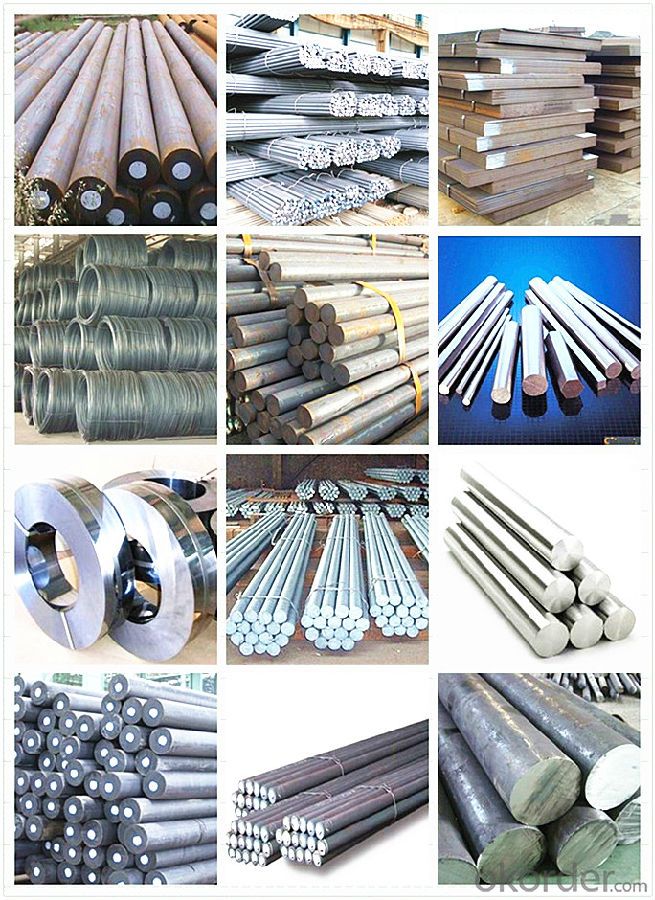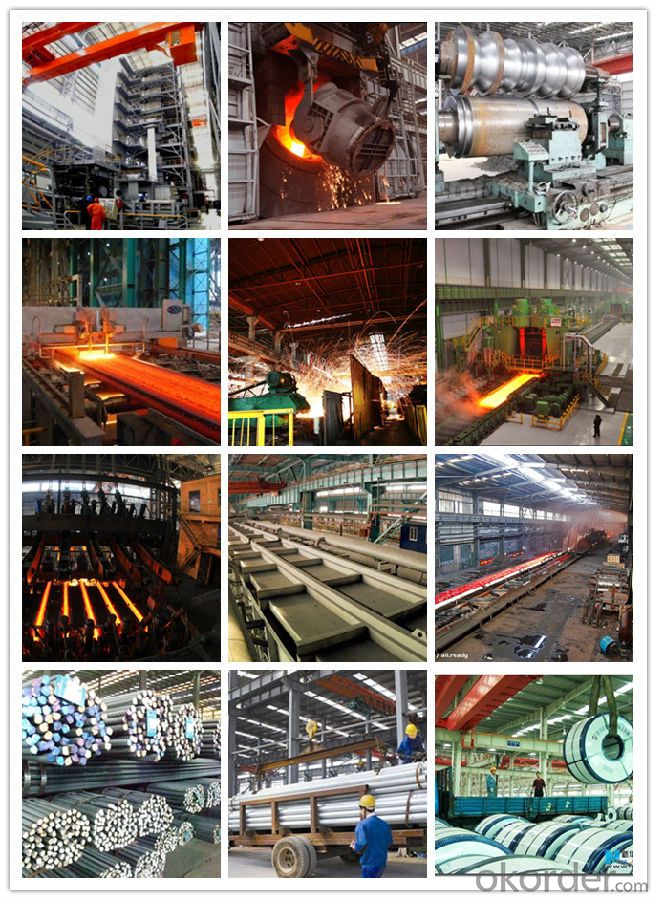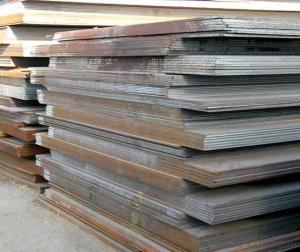Special Steel S235JR Carbon Steel Plate
- Loading Port:
- China main port
- Payment Terms:
- TT OR LC
- Min Order Qty:
- 30 m.t.
- Supply Capability:
- 10000 m.t./month
OKorder Service Pledge
OKorder Financial Service
You Might Also Like
Item specifice
Product information:
Standard | DIN | ||||||||||
Grade | S235JR | ||||||||||
MOQ | 1 Metric Ton | ||||||||||
Width Thickness | 1500-2200mm 0.3-80mm | ||||||||||
Length | 6m,12m or as required. | ||||||||||
Tolerance | Within the allowable range or as required | ||||||||||
Condition of delivery | Hot rolled,Cold Rolled or as required. | ||||||||||
Chemical Composition(%) | |||||||||||
C | Si | Mn | P | S | Cr | ||||||
0.17-0.24 | 0.17-0.37 | 0.35-0.65 | ≤ 0.03 | ≤ 0.03 | -- | ||||||
Ni | Cu | ||||||||||
| -- | -- | ||||||||||
Mechanical Properties(In Quenching and Tempering) | |||||||||||
Tensile strength | Yield strength | Elongation | Reduction in Area | Impact | Hardness | ||||||
(σb/MPa) | (σs/MPa) | (δ5/%) | (ψ/%) | (J) | (HB) | ||||||
≥420 | ≥250 | ≥25 | ≥55 | -- | ≤156 | ||||||
Product Show:

Workshop Show:

Shipping
1. FedEx/DHL/UPS/TNT for samples, Door-to-Door;
2. By Air or by Sea for batch goods, for FCL; Airport/ Port receiving;
3. Customers specifying freight forwarders or negotiable shipping methods!
Delivery Time: 3-7 days for samples; 5-25 days for batch goods.
Payment Terms
1.Payment: T/T, L/C, Western Union, MoneyGram,PayPal; 30% deposits; 70% balance before delivery.
2.MOQ: 1pcs
3.Warranty : 3 years
4.Package Informations: 1) EXPORT, In 20 feet (GW 25 ton) or 40 feet Container (GW 25 ton)
2)as customer's requirement
Why choose us?
(1) The leading exporter in China special steel industry.
(2) Large stocks for various sizes, fast delivery date.
(3) Good business relationship with China famous factories.
(4) More than 7 years steel exporting experience.
(5) Good after-sales service guarantee.
- Q:What are the main factors affecting the creep resistance of special steel?
- The main factors affecting the creep resistance of special steel are the alloy composition, the microstructure, and the processing conditions. The specific combination of alloying elements and their concentrations significantly influence the material's ability to resist deformation under elevated temperatures and constant stress. Additionally, the microstructure, including grain size and distribution, plays a crucial role in determining the material's creep resistance. The processing conditions, such as heat treatment and thermal cycling, can further affect the creep performance by altering the material's microstructure and mechanical properties.
- Q:How is tool steel different from other types of special steel?
- Tool steel is a specific type of special steel that is designed to have exceptional hardness, strength, and durability, making it ideal for applications involving cutting, shaping, and forming materials. Unlike other types of special steel, tool steel undergoes a unique heat treatment process that enhances its properties, such as wear resistance and toughness, enabling it to withstand high temperatures and repeated use without losing its edge or integrity. Additionally, tool steel often contains alloying elements like chromium, vanadium, and tungsten, which further contribute to its exceptional performance and ability to retain sharpness.
- Q:What are the requirements for special steel used in automotive parts manufacturing?
- The requirements for special steel used in automotive parts manufacturing are specific and crucial to ensure superior performance, safety, and durability of the vehicles. Here are some of the key requirements for special steel used in automotive parts manufacturing: 1. Strength and Hardness: Special steel used in automotive parts needs to have high strength and hardness to withstand the extreme stresses and loads that automotive components experience. This ensures the parts can endure heavy usage, resist deformation, and prevent failure under demanding conditions. 2. Ductility and Toughness: While being strong and hard, special steel must also possess good ductility and toughness. Ductility allows the steel to be formed and shaped into various intricate automotive parts, while toughness ensures that the parts can absorb energy and resist fracture or cracking upon impact. 3. Corrosion Resistance: Automotive parts are constantly exposed to various environmental conditions, including moisture, humidity, and road salts. Special steel used in automotive parts must exhibit excellent corrosion resistance to prevent rust and deterioration, thereby increasing the longevity and reliability of the parts. 4. Weldability: As automotive parts are often assembled through welding processes, it is essential for special steel to have good weldability. This allows for efficient and secure joining of different components, ensuring structural integrity and minimizing the risk of weld defects. 5. Heat Resistance: Special steel used in automotive parts manufacturing should have sufficient heat resistance to withstand high temperatures generated during engine operation, friction, or other thermal processes. This ensures that the steel maintains its mechanical properties even under extreme heat conditions, preventing premature failure or deformation. 6. Fatigue Strength: Automotive parts are subjected to repeated loading and unloading cycles, leading to fatigue failure if the steel does not have adequate fatigue strength. Special steel should possess high fatigue strength to withstand cyclic loading and resist fatigue cracks, enhancing the durability and reliability of the parts. 7. Dimensional Stability: Automotive parts need to maintain their shape and dimensions over time to ensure proper fit and functionality. Special steel used in manufacturing should exhibit dimensional stability, minimizing any warping or distortion during heat treatment or operational conditions. 8. Cost-effectiveness: While meeting the above requirements, special steel should also be cost-effective for automotive parts manufacturing. This means that the steel should be reasonably priced, readily available, and offer a good balance between cost and performance. Meeting these requirements is crucial for manufacturers to produce high-quality automotive parts that meet industry standards, perform optimally, and contribute to the overall safety and performance of vehicles.
- Q:How is corrosion-resistant tool steel used in the production of molds and dies?
- Corrosion-resistant tool steel is commonly used in the production of molds and dies due to its ability to withstand exposure to corrosive environments. This steel helps to prevent rust and degradation, ensuring that the molds and dies maintain their structural integrity and dimensional accuracy over time. By using corrosion-resistant tool steel, manufacturers can produce high-quality molds and dies that are durable and resistant to wear and tear, ultimately improving the overall efficiency and longevity of the production process.
- Q:Can special steel be used in the power generation equipment manufacturing industry?
- Yes, special steel can be used in the power generation equipment manufacturing industry. Special steel possesses unique properties such as high strength, resistance to corrosion, and high temperature resistance, making it suitable for the construction of components and structures used in power generation equipment. These include turbine blades, generator shafts, pressure vessels, and boiler tubes, among others. Special steel's exceptional characteristics ensure the reliability, efficiency, and durability of power generation equipment, making it an essential material in the industry.
- Q:How does special steel compare to other materials, such as aluminum or titanium?
- Special steel is known for its exceptional strength, durability, and resistance to wear and tear, making it superior to materials like aluminum or titanium in various applications. While aluminum is lightweight, it lacks the same level of strength and toughness as special steel. Titanium, on the other hand, offers comparable strength but is significantly more expensive. Special steel strikes a balance between strength, cost-effectiveness, and versatility, making it a preferred choice in many industries.
- Q:What are the environmental impacts of using special steel?
- The use of special steel can have several environmental impacts. Firstly, the production of special steel involves the extraction of raw materials such as iron ore and coal, which can lead to deforestation, habitat destruction, and loss of biodiversity. The mining process can also result in the release of pollutants into the air, soil, and water, contributing to air and water pollution. Another environmental impact of special steel production is the emission of greenhouse gases, particularly carbon dioxide (CO2), during the manufacturing process. The high temperatures required to melt and shape the steel, as well as the energy-intensive processes involved, result in significant CO2 emissions. These emissions contribute to climate change and global warming. Furthermore, the transportation of special steel can also have environmental consequences. The shipping and logistics involved in transporting the steel from production facilities to end-users can result in additional greenhouse gas emissions, air pollution, and fuel consumption. Additionally, the disposal of special steel products at the end of their lifecycle can pose environmental challenges. If not properly recycled or disposed of, steel products can end up in landfills, taking up valuable space and potentially leaching harmful substances into the environment. Despite these environmental impacts, it is important to note that special steel is often used in various industries due to its durability, strength, and resistance to corrosion. Efforts are being made to mitigate these impacts through the adoption of cleaner production methods, such as recycling and using renewable energy sources in the steel manufacturing process. Additionally, initiatives like carbon capture and storage are being explored to reduce greenhouse gas emissions from steel production. Overall, while the use of special steel provides numerous benefits, it is critical to balance these advantages with the need to minimize its environmental impacts through sustainable production and responsible disposal practices.
- Q:How does special steel perform in high-pressure hydrogen environments?
- Special steel performs well in high-pressure hydrogen environments due to its high strength, corrosion resistance, and ability to withstand hydrogen embrittlement. It offers reliable performance and minimizes the risk of hydrogen-induced failures, making it a suitable choice for applications such as hydrogen storage, transportation, and fuel cells.
- Q:Can special steel be used in the defense sector?
- Indeed, in the defense sector, special steel finds itself as a viable option. Special steel, which encompasses alloys or compositions designed with specific attributes such as high strength, hardness, resistance to corrosion, or heat resistance, proves to be suitable for a range of defense applications. These applications include the construction of armored vehicles, naval vessels, aircraft, and weaponry. Within the defense sector, special steel serves as a valuable resource for manufacturing components and structures necessitating exceptional strength and durability. For instance, it can be utilized to produce armor plates for tanks and armored vehicles, which must endure high impact and ballistic threats. Additionally, special steel can be employed in the construction of naval vessels, providing corrosion resistance and enhancing overall structural integrity. Furthermore, the defense industry heavily relies on special steel for manufacturing aircraft parts and weaponry. Aircraft components, such as landing gear, engine parts, and structural elements, demand materials of high strength to ensure safe and reliable operation. Special steel alloys fulfill this requirement by providing the necessary strength and resistance to extreme conditions, including high temperatures and pressures, making them an ideal choice for these applications. Moreover, special steel plays a vital role in the production of various types of weapons, such as firearms and blades. Its exceptional strength and hardness properties render it suitable for manufacturing gun barrels, bulletproof vests, and knives employed by military personnel. To summarize, special steel holds significant value within the defense sector due to its exceptional properties, including strength, hardness, corrosion resistance, and heat resistance. Its extensive applications in the construction of armored vehicles, naval vessels, aircraft, and weaponry ensure the safety, durability, and effectiveness of military equipment.
- Q:How does the heat treatment process affect the properties of special steel?
- The heat treatment process can significantly affect the properties of special steel. It involves heating the steel to a specific temperature and then cooling it at a controlled rate to alter its microstructure. This process can change the steel's hardness, strength, toughness, and even its resistance to corrosion. By manipulating the heat treatment parameters, such as temperature, time, and cooling rate, manufacturers can tailor the properties of special steel to meet specific requirements for different applications.
1. Manufacturer Overview |
|
|---|---|
| Location | |
| Year Established | |
| Annual Output Value | |
| Main Markets | |
| Company Certifications | |
2. Manufacturer Certificates |
|
|---|---|
| a) Certification Name | |
| Range | |
| Reference | |
| Validity Period | |
3. Manufacturer Capability |
|
|---|---|
| a)Trade Capacity | |
| Nearest Port | |
| Export Percentage | |
| No.of Employees in Trade Department | |
| Language Spoken: | |
| b)Factory Information | |
| Factory Size: | |
| No. of Production Lines | |
| Contract Manufacturing | |
| Product Price Range | |
Send your message to us
Special Steel S235JR Carbon Steel Plate
- Loading Port:
- China main port
- Payment Terms:
- TT OR LC
- Min Order Qty:
- 30 m.t.
- Supply Capability:
- 10000 m.t./month
OKorder Service Pledge
OKorder Financial Service
Similar products
New products
Hot products
Related keywords





























